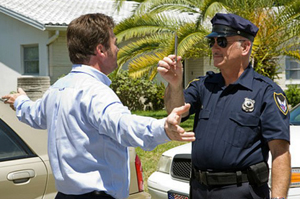 When you’ve been pulled over by law enforcement officers in New Jersey because of suspicions that you are driving while intoxicated, one of the first things you can expect, after the officer asks if you have been drinking, is to be subjected to a blood alcohol test. You have the right to refuse to take the test, but the consequences of making that decision can be severe. That’s because New Jersey applies the law of “implied consent” to traffic stops involving DWI investigations.
When you’ve been pulled over by law enforcement officers in New Jersey because of suspicions that you are driving while intoxicated, one of the first things you can expect, after the officer asks if you have been drinking, is to be subjected to a blood alcohol test. You have the right to refuse to take the test, but the consequences of making that decision can be severe. That’s because New Jersey applies the law of “implied consent” to traffic stops involving DWI investigations.
“Implied Consent” Defined
The principle of implied consent holds that, simply by getting behind the wheel of a vehicle, you have agreed to take any chemical test requested by a police officer to determine whether you are under the influence of any substance that would negatively affect your ability to safely operate the vehicle. Such consent is deemed to be implied, because it applies regardless of whether you affirmatively agree to submit to the test, and even if you verbally indicate that you won’t take the test.
The officer, however, cannot compel you to take the test. However, if it’s the first time you’ve refused to comply with a breathalyzer request, you’ll immediately have your license suspended for seven months. A second refusal will cause you to lose your license for two years and a third will result in a 10 year revocation of your driving privileges.
Contact Attorney Michael Curtis Greenberg
Don’t lose your license or go to jail. Let us fight to protect your rights!
There’s no charge for your first consultation. We are available to meet with you evenings and weekends, if necessary, and can travel to your home or to detention to discuss your case. We accept all credit cards, as well as PayPal.
To schedule an appointment, contact us by e-mail or call our office at 855-598-3650.
Named One of the Top 100 New Jersey Criminal Trial Lawyers in 2015
by
The American Society of Legal Advocates


